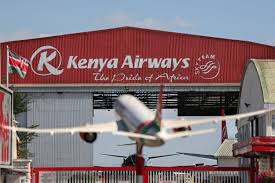Kenya’s national airline, Kenya Airways (KQ), has expanded its workforce by 8% in 2024, bringing the total number of employees to 4,705. This growth in staff came during a landmark year for the airline, as it also posted its first pretax profit in more than a decade, signalling recovery from years of operational and financial challenges.
In its latest sustainability report, KQ disclosed that a major portion of its employees fall within the 30 to 50-year age bracket, which represents 72% of the workforce. The gender distribution has also seen progress, with women now accounting for 44% of all employees, up from 42% in 2023. According to the airline’s Chief Executive Officer, Allan Kilavuka, the company is on track to reach its target of 25% female representation in leadership roles by 2025.
Mr. Kilavuka explained that “We are firmly on track to achieve our 25% women in leadership target by 2025,” emphasising the airline’s ongoing commitment to gender inclusion and workforce diversity. The sustainability report further revealed that 82.9% of KQ’s staff are now on permanent contracts, which reflects a trend towards more stable employment in the airline’s HR strategy. While the overall employee turnover rate was 4.82%, Kenya Airways onboarded 12% new hires in 2024, introducing fresh talent into various departments.
These developments in workforce management align with Kenya Airways’ broader transformation agenda, aimed at positioning the airline for long-term stability and profitability. One of the standout features in 2024 was the airline’s financial turnaround. Kenya Airways reported a pretax profit of KSh 5.53 billion, largely driven by foreign-exchange gains of KSh 10.55 billion. This marked a strong reversal from the KSh 15.04 billion forex loss recorded in 2023. The airline benefited from the Kenyan shilling’s 20% appreciation against the US dollar, helping it ease debt service obligations and boost foreign-denominated revenues.
Kenya Airways has long struggled under the weight of mounting debt, rising fuel costs, and COVID-19-related disruptions. The 2024 results mark the first time in over ten years that the national carrier posted a profit before tax. Industry watchers view the airline’s positive performance as a result of both financial restructuring and operational reforms introduced by the current management.
In addition to its financial and workforce updates, the airline also shared updates on its internal governance mechanisms. The whistleblower system implemented at Kenya Airways has seen 75% of reported cases resolved, with 2% still open and 22% considered unsubstantiated. Among the issues reported were fraud, conflicts of interest, discrimination, accounting irregularities, product quality concerns, and theft of company assets. The management noted that it remains committed to transparency and ethical business practices, and that whistleblower protection remains a top priority.
Kenya Airways has also made strides in improving employee welfare, as seen in its increased reliance on permanent contracts and its emphasis on diversity, equity, and inclusion. These improvements are expected to strengthen employee morale and reduce turnover in the coming years.
The airline’s recovery comes at a critical time, as African carriers face increasing competition and rising operating costs. With strategic partnerships, route expansion, and digital transformation efforts in the pipeline, Kenya Airways is positioning itself not only to remain competitive in the East African region but also to play a more significant role in intra-African connectivity, in line with the African Continental Free Trade Area (AfCFTA) objectives.
As the airline continues to build on its 2024 performance, all eyes will be on how well it sustains profitability and meets its workforce development targets. KQ’s ability to maintain financial discipline, improve governance, and strengthen its workforce is seen as central to its long-term viability.
